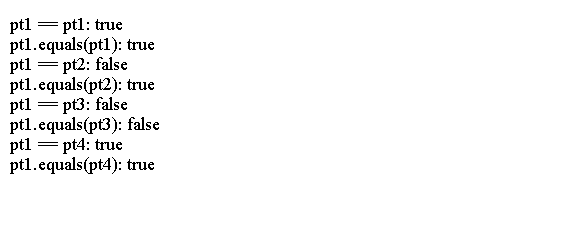Java Object.Equals方法
2018-01-18 16:54 更新
Java面向对象设计 - Java Object.Equals方法
以下代码显示如何实现equals()和hashCode()方法
class Point {
private int x;
private int y;
public Point(int x, int y) {
this.x = x;
this.y = y;
}
/* implement the equals() method */
public boolean equals(Object otherObject) {
// Are the same?
if (this == otherObject) {
return true;
}
// Is otherObject a null reference?
if (otherObject == null) {
return false;
}
// Do they belong to the same class?
if (this.getClass() != otherObject.getClass()) {
return false;
}
// Get the reference of otherObject in a SmartPoint variable
Point otherPoint = (Point) otherObject;
// Do they have the same x and y co-ordinates
boolean isSamePoint = (this.x == otherPoint.x && this.y == otherPoint.y);
return isSamePoint;
}
/*
* implement hashCode() method of the Object class, which is a requirement
* when you implement equals() method
*/
public int hashCode() {
return (this.x + this.y);
}
}
public class Main {
public static void main(String[] args) {
Point pt1 = new Point(10, 10);
Point pt2 = new Point(10, 10);
Point pt3 = new Point(12, 19);
Point pt4 = pt1;
System.out.println("pt1 == pt1: " + (pt1 == pt1));
System.out.println("pt1.equals(pt1): " + pt1.equals(pt1));
System.out.println("pt1 == pt2: " + (pt1 == pt2));
System.out.println("pt1.equals(pt2): " + pt1.equals(pt2));
System.out.println("pt1 == pt3: " + (pt1 == pt3));
System.out.println("pt1.equals(pt3): " + pt1.equals(pt3));
System.out.println("pt1 == pt4: " + (pt1 == pt4));
System.out.println("pt1.equals(pt4): " + pt1.equals(pt4));
}
}
上面的代码生成以下结果。

注意
这里是equals()方法的实现的规范。假设x,y和z是三个对象的非空引用。
- 自反性。表达式x.equals(x)应该返回true。
- 对称性。如果x.equals(y)返回true,y.equals(x)必须返回true。
- 传递性。如果x.equals(y)返回true,y.equals(z)返回true,则x.equals(z)必须返回true。
- 一致性。如果x.equals(y)返回true,它应该保持返回true,直到x或y的状态被修改。如果x.equals(y)返回false,它应该保持返回false,直到x或y的状态被修改。
- 与空引用的比较:任何类的对象不应等于空引用。表达式x.equals(null)应始终返回false。
- 与hashCode()方法的关系:如果x.equals(y)返回true,x.hashCode()必须返回与y.hashCode()相同的值。
以上内容是否对您有帮助:




更多建议: